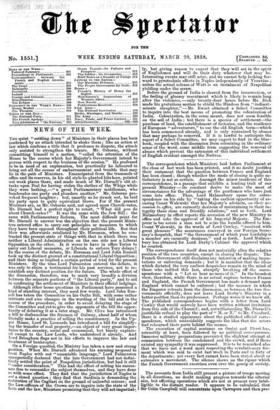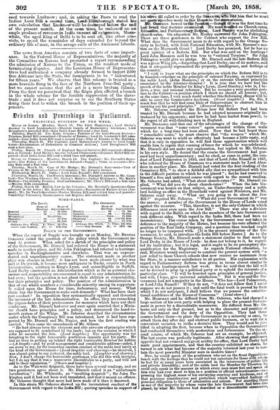NEWS OF THE WEEK.
THE quiet "settling down" of Ministers in their places has been confirmed by an attack intended to shake them ; like an action at law which confirms a title that it professes to dispute, the attack only assisted to strengthen the tenure. Mr. Osborne, without committing himself to a motion, " called the attention of the House to the course which her kajesty's Government intend to pursue with respect to the business of the session." He professed to be in need of an explanation, but practically he laboured to bring out all the causes of embarrassment and trouble that may lie in the path of Ministers. Emancipated from the trammels of office and its reserves, in his old style he planted hits here, pointed out weak places there, and made much of Mr. Disraeli's old at- tacks upon Peel for having stolen the clothes of the Whigs while they were bathing,—" a great Parliamentary middleman, who bamboozles one party and plunders another." Mr. Osborne pro- voked frequent laughter ; but, smartly as he struck out, he laid his party open to quite equivalent blows. For if the present Ministers are, as Mr. Osborne said, not agreed upon Church-rates, Mr. Disraeli had a perfect right to retort, " What did you do about Church-rates ?" It was the same with the Jew Bill ; the same with Parliamentary Reform. The most difficult point for Mr. Disraeli to answer was the objection that the present Minis- ters entered office to carry out principles or measures to which they have been opposed throughout their political life. But that blow was afterwards retaliated by Mr. Horsman, when he con- trasted the present state of things with that in which there was neither a Liberal Administration on the one side nor a Liberal Opposition on the other. Is it worse to have in office Tories to carry out Liberal measures, or Liberals to enforce Tory delays ? In the course of the debate, Mr. Horsman and Lord John Russell took up the distinct ground of a constitutional Liberal Opposition; and their doing so implied a certain period of trial for the present Ministers. By the time Lord Palmerston entered the debate, it was only to claim a testimonial for his past services, not to re- establish any distinct position for the future. The whole effect of the discussion, therefore was to mark very broadly a division between the separate portions of "the Liberal party," and to aid. in confirming the settlement of Ministers in their official lodgings.
Although other home questions in Parliament have possessed. a kind of standing interest, they need few words. Lord John Rus- sell has taken the Committee on his Oaths Bill, with some rather intricate and nice changes in the wording of the bill and in the course of the procedure, in order to avoid. delaying the stage of the Committee and yet to give the opponents of the bill the oppor- tunity of debating it at a later stage. Mr. Clive has introduced a bill to disfranchise the freemen of Galway, about half of whom literally make a _practice of selling the constituency. In the Up- per House, Lord St. Leonards has introduced a bill for simplify- ing the transfer of real property,—an object of very great impor- tance to the country, social and economical, but barely explain- ed except to the Law Lords, who understood it already. And Lord Brougham flags not in his efforts to improve the law and treatment of bankruptcy.
On a Foreign question the Ministry has taken a new and strong position. When Mr. Disraeli advanced his amusing proposal to treat Naples with not " unamiable language," Lord Palmerston unexpectedly declared that the late Government had not defini- tively settled the point of Neapolitan jurisdiction, but had it still " under consideration." This had the effect of setting his succes- sors free to reconsider the subject themselves, and they have done so with some effect. They find that the jurisdiction of Naples is not a closed question ; they find. that Sardinia is demanding the restitution of the Cagliari on the ground of unlawful seizure ; and the Law-officers of the Crown are to inquire into the state of the facts and the law, Ministers promising that they will sot
ly, but giving reason to expect that they will aot in the spirit of Englishmen and will do their duty whatever that may be. Interesting events may still arise, and we cannot help looking for- ward to pyrotechnic effects in Naples independently of Vesuvius ; unless the actual release of Watt is an instalment of Neapolitan yielding under the screw. Before the ground of India is cleared from the insurrection, or the feeling of gloomy resentment which is likely to remain long after the violences, —only twenty-four hours before Mr. Rich made his gratuitous motion to shield the Hindoos from "indiscri- minate slaughter,"—Mr. Ewart obtained a Select Committee to inquire into the best means of promoting the colonization of India. Colonization, in the sense meant, does not seem feasible on the soil of India ; but there is a species of settlement—the purchase of land, the establishment of factories, and the residence of European " adventurers," to use the old English term—which has been commenced already, and is only restrained by abuses that may perhaps be removed. If it is lawful to anticipate the report of a Select Committee, we may expect to find in the blue- book, coupled with the dissuasion from colonizing in the ordinary sense of the word, some middle term suggesting .the removal of abuses which prevent the extension of this individual settlement of English resident amongst the Natives.
The correspondence which Ministers laid before Parliament at the close of last week has been printed, and it no doubtustifies their statement that the question between France and. England has been closed ; though whether the mode of closing is quite sa- tisfactory is not so certain. Amongst the minor incidents of this correspondence, is a passage that exhibits a leading trait of our present Ministry —its constant desire to make the most of circumstances for the advantage of the gentlemen who have just come into office. Thus, Lord Malmesbury opens the corre- spondence on his side by "taking the earliest opportunity of as- suring Count Walewski that her Majesty's advisers, on their ac- cession to office, are earnestly desirous of maintaining in their in- tegrity those close and friendly relations," and so forth. Lord Malmesbury in effect reports the accession of the new Ministry to office and asks the approval of his Imperial Majesty. The Em- peror is too astute a man not to seize the handle offered to him. Count Walewski, in the words of Lord Cowley, "received with great pleasure" the assurances conveyed in our Foreign Secre- tary's despatch, that " the Government of which your Lordship is a member are earnestly desirous," and so forth. Lord Malmes- bury has obtained for Lord Derby's Cabinet the approval which he courted.
The correspondence itself does not materially alter the relative position of the two countries, except in closing the dispute. The French Government still disclaims any intention of making impu- tations or enforcing demands ; but it is manifest that the ideas which dictated the very earliest despatches remain in the mind of those who indited this last, abruptly breaking off the _ corre- spondence with a " Let us hear no more of it." In the broadest view, therefore, while there is no actual rupture between France and England, the French Government has made a demand upon England which cannot be enforced ; but the manner in which the Emperor retreats from the discussion, as between the two Go- vernments officially, does not leave Lord Derby's Ministry in a better position than its predecessor. Perhaps worse if we knew all. The published correspondence begins with a letter from Lord Cowley that would scarcely have been written without invitation from this side of the Channel ; and, notwithstanding Mr. Disraeli's justifiable refusal to play the part of " M. or N." to Mr. Craufurd, there is a studied appearance about the published official corre- spondence, which unavoidably suggests the idea that the actors had rehearsed their parts behind the scenes. The execution of capital sentence on Orsini and Pierri has, ostensibly at least, been followed by no political consequences. Immense military preparations prevented the slightest attempt at communion between the condemned and the crowd, and if there existed any sympathy it was suppressed. It is to be remarked also that we have not a word more respecting the revolutionary fer- ment which was said to exist last week in Paris and in forty of the departments ; yet every fact cannot have been stated about so extensive a movement. The silence shows us the rigour which the French Government exercises even over the gossip of society.
The accounts from India still present a pioture of troops moving in all directions, no doubt making progress towards* the ulterior aim, but effecting operations which are not at present very intel- ligible to the distant reader. It appears to be calculated that Sir Colin Campbell will conoentrate upon Oawnpore and then pro- teed towards Lucknow ; and, in asking the Peers to read the Indian Loan Bill at second tune, Loeb Elleaborough staled his own calculation that Lneknoisswilli be destroyed Before the tea of the present month. At the same tam% he rookonedt on an ample produce of revenue-sin India ttameet elf exisanciest. Mean- while, the aged King of Delhi is to be sent off, like other con- victs, to spend the remainder of days extended far beyond the ordinary life of man, in the savage exile of the Andaman Islands.
The news from America consists of two facts of some import- ance. In the Federal House of Representatives, the majority of the Committee on Kansas had presented a report recommendlag the admission of Kansas to the Union, as the readiest mode of terminating disputes. And the Louisiana House of Representa- tives had authorized a company already formed to import 2500 free Africans into the State, the immigrants to be " indentured for fifteen years." We observe that this scheme is treated as a mere bravado flung in the face of the Northern Free-Soil party ; but we cannot assume that the act is a mere brutum fulmen. From the first we perceived that the Regis plan effected a breach in the whole scheme for the forcible suppression of the slave- trade ; and it does not surprise us to see the Southern States doing their best to widen the breach in the position of their op- ponents.



























 Previous page
Previous page